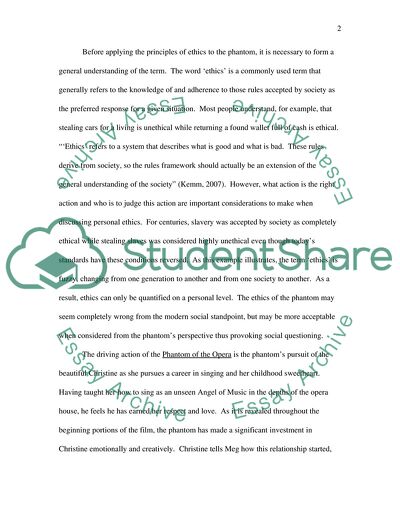
- Home
- Free Samples
- Premium Essays
- Editing Services
- Extra Tools
- Essay Writing Help
- About Us
- Studentshare
- Subjects
- Miscellaneous
- Ethical issues in a movie
Ethical issues in a movie - Essay Example

- Subject: Miscellaneous
- Type: Essay
- Level: Undergraduate
- Pages: 4 (1000 words)
- Downloads: 0
- Author: augustinesipes
Extract of sample "Ethical issues in a movie"
Hollywood films are able to capture the sense of current modes of thought in terms of political, social and economic structure in a given part of society at the same time that they illustrate how individual thought is formed. They are also able to provoke questions regarding social ethics and expected modes of behavior. An example of how film can provoke questions regarding ethics can be found in the 2004 film The Phantom of the Opera, primarily through the title character as he makes flawed but understandable decisions regarding Christine and his greater society.
Before applying the principles of ethics to the phantom, it is necessary to form a general understanding of the term. The word ‘ethics’ is a commonly used term that generally refers to the knowledge of and adherence to those rules accepted by society as the preferred response for a given situation. Most people understand, for example, that stealing cars for a living is unethical while returning a found wallet full of cash is ethical. “‘Ethics’ refers to a system that describes what is good and what is bad.
These rules derive from society, so the rules framework should actually be an extension of the general understanding of the society” (Kemm, 2007). However, what action is the right action and who is to judge this action are important considerations to make when discussing personal ethics. For centuries, slavery was accepted by society as completely ethical while stealing slaves was considered highly unethical even though today’s standards have these conditions reversed. As this example illustrates, the term ‘ethics’ is fuzzy, changing from one generation to another and from one society to another.
As a result, ethics can only be quantified on a personal level. The ethics of the phantom may seem completely wrong from the modern social
...Download file to see next pages Read MoreCHECK THESE SAMPLES OF Ethical issues in a movie
Movie Piracy - Is There a Solution
Ethics in Marketing Practices
Defining Ethical Issues in Journalism
(Love) Ethical Issues in Healthcare
The Downloading and Sharing Intellectual Properties Online Ethically Justifiable or not
The Pedagogical Strategy of Ethics in Micro-Ethical Issues
Relevance of Business Ethics
Analyzing Business Ethics in Two Movies - Wall Street and Election

- TERMS & CONDITIONS
- PRIVACY POLICY
- COOKIES POLICY